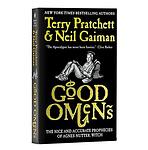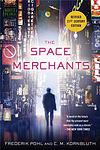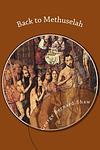The Greatest "Science fiction, Satire" Books of All Time
Click to learn how this list is calculated.
This list represents a comprehensive and trusted collection of the greatest books. Developed through a specialized algorithm, it brings together 300 'best of' book lists to form a definitive guide to the world's most acclaimed books. For those interested in how these books are chosen, additional details can be found on the rankings page.
Genres
Science fiction is a genre of literature that explores the potential consequences of scientific and other innovations on society and individuals. It often features futuristic or imaginary settings, advanced technologies, and scientific concepts that are not yet fully understood or realized. Science fiction can encompass a wide range of themes, including space exploration, time travel, artificial intelligence, and alternate realities. It is a genre that allows authors to speculate on the future of humanity and the impact of scientific progress on our lives.
Satire is a genre of literature that uses humor, irony, and exaggeration to criticize and ridicule human vices, follies, and shortcomings. It is a form of social commentary that aims to expose the flaws and absurdities of society, politics, and culture. Satirical books often employ sarcasm, wit, and parody to challenge the status quo and provoke thought and reflection in readers. Satire can be both entertaining and thought-provoking, and it has been used throughout history as a powerful tool for social and political critique.
Countries
Date Range
Reading Statistics
Click the button below to see how many of these books you've read!
Download
If you're interested in downloading this list as a CSV file for use in a spreadsheet application, you can easily do so by clicking the button below. Please note that to ensure a manageable file size and faster download, the CSV will include details for only the first 500 books.
Download-
1. Nineteen Eighty Four by George Orwell
Set in a dystopian future, the novel presents a society under the total control of a totalitarian regime, led by the omnipresent Big Brother. The protagonist, a low-ranking member of 'the Party', begins to question the regime and falls in love with a woman, an act of rebellion in a world where independent thought, dissent, and love are prohibited. The novel explores themes of surveillance, censorship, and the manipulation of truth.
-
2. Brave New World by Aldous Huxley
Set in a dystopian future, the novel explores a society where human beings are genetically bred and pharmaceutically conditioned to serve in a ruling order. The society is divided into five castes, each with its specific roles. The narrative follows a savage who rejects the norms of this new world order and struggles to navigate the clash between the values of his upbringing and the reality of this technologically advanced, emotionless society. His resistance prompts a deep examination of the nature of freedom, individuality, and happiness.
-
3. Slaughterhouse-Five by Kurt Vonnegut
The novel follows the life of Billy Pilgrim, a World War II veteran who has become "unstuck in time," experiencing his life events out of order. This includes his experiences as a prisoner of war in Dresden during the Allies' firebombing, his post-war life as a successful optometrist, his abduction by aliens from the planet Tralfamadore, and his eventual death. The book is a critique of war and a demonstration of the destructive nature of time, with a nonlinear narrative that reflects the chaos and unpredictability of life.
-
4. The Hitchhiker's Guide to the Galaxy by Douglas Adams
This comedic science fiction novel follows the intergalactic adventures of an unwitting human, Arthur Dent, who is rescued just before Earth's destruction by his friend Ford Prefect, a researcher for a galactic travel guide. Together, they hitch a ride on a stolen spaceship, encountering a range of bizarre characters, including a depressed robot and a two-headed ex-president of the galaxy. Through a series of satirical and absurd escapades, the book explores themes of existentialism, bureaucracy, and the absurdity of life, all while poking fun at the science fiction genre and offering witty commentary on the human condition.
-
5. A Clockwork Orange by Anthony Burgess
This novel follows the life of a violent young man named Alex, who is part of a youth subculture in a dystopian future England. Alex and his gang engage in a nightmarish spree of rape, assault, and robbery, until he is arrested and subjected to a psychological experiment by the government to "cure" him of his violent tendencies. The novel explores themes of free will, morality, and the nature of evil, while using a unique slang language invented by the author.
-
6. We by Yevgeny Zamyatin
In this dystopian novel, the story is set in the future, where the protagonist, a mathematician, lives in a highly regulated society where citizens are known by numbers, not names, and every action is dictated by the state. Individuality and freedom are suppressed, and even the concept of love is replaced by regulated sexual liaisons. The mathematician begins to question the infallibility of the state after meeting a rebellious woman, leading to a series of events that challenge the very foundations of his world.
-
7. Cat's Cradle by Kurt Vonnegut
This novel is a satirical commentary on modern man and his madness, exploring issues of science, technology, and religion. The story revolves around a narrator who becomes involved with the children of a deceased scientist, who had developed a substance capable of freezing water at room temperature. This substance, if misused, has the potential to end all life on earth. The novel is filled with strange and twisted characters, and culminates in a cataclysmic event, highlighting the dangers of uncontrolled technological advancement.
-
8. The Sirens of Titan by Kurt Vonnegut
The novel explores the life of Malachi Constant, the richest man in a future America, who has gained his wealth due to his father's foresight in investing in companies that benefit from the space race. The narrative takes him from Earth to Mars, Mercury, back to Earth, and finally to one of Saturn's moons, Titan. Along the way, he experiences a series of bizarre, humorous, and tragic events that reveal the senselessness of war and the emptiness of a life devoid of love. The novel offers a biting critique of capitalism, militarism, and religion, while also exploring themes of free will, determinism, and the search for meaning.
-
9. Good Omens by Terry Pratchett, Neil Gaiman
"Good Omens" is a humorous take on the biblical Apocalypse, following an angel and a demon who have grown fond of Earth and its inhabitants, and are not too keen on the impending end of the world. As they try to locate the misplaced Antichrist and prevent the Four Horsemen from bringing about Armageddon, they encounter an array of quirky characters, including witch-hunters, modern-day witches, and the Four Horsemen themselves. The novel combines comedy, fantasy, and philosophical themes, offering a satirical critique of religious prophecy and human nature.
-
10. Dirk Gently's Holistic Detective Agency by Douglas Adams
This humorous science fiction novel follows the eccentric detective Dirk Gently, who operates based on the fundamental interconnectedness of all things. His cases involve time travel, ghosts, and an Electric Monk, a labor-saving device that believes things for you. Dirk's current investigation revolves around the disappearance of a cat, a multimillionaire, and a horse in a bathroom, all seemingly unrelated events, but in Dirk's holistic world, everything is connected.
-
11. War with the Newts by Karel Čapek
The novel is a satirical science fiction tale that explores the discovery of a species of intelligent giant newts. When humans realise they can exploit these creatures for economic gain, they are enslaved and used for labor and military purposes. The newts ultimately rebel, leading to a global war. The book serves as a critique of various political, economic and ideological systems, including colonialism, capitalism and fascism.
-
12. The Female Man by Joanna Russ
"The Female Man" is a thought-provoking science fiction novel that explores the lives of four women from different dimensions and time periods. As they navigate their respective worlds, the women confront gender inequality, societal expectations, and the limitations imposed on them by a patriarchal society. Through their encounters and conversations, the novel challenges traditional gender roles and offers a powerful critique of sexism and discrimination.
-
13. The Space Merchants by Frederik Pohl, C.M. Kornbluth
"The Space Merchants" is a dystopian science fiction novel set in a future where corporations have taken over the world and consumerism is rampant. The story follows a talented advertising executive who is tasked with creating an ad campaign to entice people to colonize Venus. As he delves deeper into his work, he uncovers the dark secrets behind the corporate-controlled society and becomes determined to fight against the oppressive system.
-
14. Stand on Zanzibar by John Brunner
The novel is a dystopian vision of the year 2010, where the world grapples with overpopulation, ecological disasters, and widespread social unrest. It follows a multitude of characters, including a high-level executive and a data analyst, as they navigate a society dominated by multinational corporations and a supercomputer that predicts social trends. The narrative is fragmented, employing a unique style that interweaves different types of texts to reflect the chaotic and information-saturated world it depicts. Themes of eugenics, media saturation, and corporate power are explored in a world that is at once technologically advanced and socially fragmented.
-
15. The Futurological Congress by Stanislaw Lem
In a dystopian future, the protagonist attends a scientific conference where he is exposed to a new hallucinogenic drug that transports him to a surreal and chaotic world. As he navigates through this bizarre reality, he becomes entangled in a conspiracy involving mind-altering technology, political manipulation, and the struggle for power. This satirical novel explores themes of reality, identity, and the dangers of unchecked technological advancements.
-
16. The Glass Bees by Ernst Jünger
"The Glass Bees" is a novel set in a future dystopian society, where technology has advanced to the point where robotic bees are being used for honey production. The story follows a former cavalryman who, desperate for employment, accepts a job from a powerful technocrat to test out these mechanical bees. As the protagonist gets more involved in the technocrat's world, he begins to question the morality and implications of such advancements, leading to a deep exploration of the intersection between technology and nature, and the potential consequences of unchecked technological progress.
-
17. Camp Concentration by Thomas M. Disch
In this speculative fiction novel, the story unfolds in a dystopian future where the U.S. government, engaged in an unwinnable war, turns to unethical experiments to enhance human intelligence. Prisoners are injected with a syphilis strain designed to boost their intellect while shortening their lifespan. The narrative, presented through the journal entries of a conscientious objector who becomes an inmate and an observer of the program, explores the moral and philosophical implications of sacrificing humanity for the sake of intellectual advancement. As the experiment progresses, the heightened intelligence of the inmates leads to unforeseen consequences, challenging the very nature of power, knowledge, and the human condition.
-
18. Cat Country by Lao She
This novel is a satirical science fiction tale that transports the reader to Mars, where the protagonist, a Chinese man, finds himself stranded in a society inhabited by cat-like humanoids. The narrative delves into the peculiarities and dysfunctions of this Martian civilization, known as Cat Country, highlighting its inhabitants' indolence, corruption, and societal decay. Through the lens of this alien society, the author critiques various aspects of early 20th-century Chinese society, politics, and culture, using the allegorical Cat Country to reflect on human follies, the dangers of political apathy, and the consequences of societal neglect. The story is both a unique exploration of extraterrestrial life and a poignant commentary on the human condition.
-
19. La Saga/ Fuga de J. B./ The Saga/ Escape of J.B. by Gonzalo Torrente Ballester
"La Saga/ Fuga de J. B./ The Saga/ Escape of J.B." is a complex narrative that explores the themes of reality and fiction, and their intersection. The story revolves around a mysterious character, J.B., who escapes from a novel into the real world. As he navigates this new realm, the boundaries between the fictional world he came from and the reality he now inhabits become increasingly blurred, leading to a surreal and thought-provoking exploration of the nature of existence.
-
20. The End Of The World News by Anthony Burgess
This novel is an ambitious and unconventional triptych that interweaves three distinct narratives: the psychoanalytic adventures of Sigmund Freud, the escapades of Leon Trotsky aboard a ship to New York, and a science fiction tale about the impending collision of Earth with a rogue planet. Through a daring blend of historical fiction, political drama, and speculative storytelling, the book explores themes of human desire, societal upheaval, and the existential threats facing civilization. Its innovative structure and the juxtaposition of seemingly disparate stories challenge readers to consider the interconnectedness of personal, political, and cosmic destinies.
-
21. The Cyberiad by Stanislaw Lem
"The Cyberiad" is a collection of science fiction short stories that take place in a futuristic universe where robots and artificial intelligence are prevalent. The book follows the adventures of two master inventors, Trurl and Klapaucius, as they encounter various challenges and engage in extraordinary feats of engineering and problem-solving. Through witty and imaginative storytelling, the book explores themes of technology, creativity, and the nature of humanity, offering a captivating and thought-provoking reading experience.
-
22. Micromégas by Voltaire
"Micromégas" is a philosophical satire that tells the story of a giant from a planet circling the star Sirius, and his adventures traveling through the universe. Along with a companion from Saturn, who is also of considerable size though smaller than Micromégas, they visit Earth. Here, they interact with humanity, initially struggling to even perceive humans due to the vast difference in scale. The story explores themes of perspective, the relative nature of size and intelligence, and the limitations of human understanding. Through witty dialogue and ironic situations, the narrative critiques the arrogance and ignorance of human institutions and philosophies, highlighting the enlightenment ideals of reason and empirical knowledge.
-
23. Back To Methuselah by George Bernard Shaw
"Back to Methuselah" is a collection of five plays that span from the Garden of Eden to the distant future, exploring themes of longevity, evolution, and human development. The work presents a philosophical examination of the human condition, with characters that live for centuries, allowing the author to critique the social and political norms of different eras. The central idea is that humans must willfully evolve to achieve longer lifespans, greater wisdom, and a more profound understanding of their potential. Through a blend of comedy, drama, and speculative thought, the plays challenge readers to consider the possibilities of human progress and the necessity of embracing change for survival.
-
24. The Possibility Of An Island by Michel Houellebecq
The novel explores the life and thoughts of a successful comedian who, disillusioned with the superficiality and decay of human relationships in a hedonistic society, becomes involved with a cult that seeks immortality through cloning and genetic manipulation. As the narrative alternates between the comedian's experiences and the reflections of his future cloned descendants, it delves into themes of existential despair, the search for meaning, and the consequences of eternal life. The story weaves a bleak and satirical tapestry of humanity's obsession with youth, sex, and death, ultimately questioning the very nature of human progress and happiness.
-
25. Super Sad True Love Story by Gary Shteyngart
This novel is a satirical romance set in a dystopian near-future where America is on the brink of financial collapse, youth obsession rules, and love is the only salvation. The story revolves around a middle-aged, neurotic man who falls in love with a much younger woman in a society where digital communication is the norm, and privacy is a thing of the past. Their relationship unfolds amidst a backdrop of economic and social chaos, providing a poignant commentary on modern life.
Reading Statistics
Click the button below to see how many of these books you've read!
Download
If you're interested in downloading this list as a CSV file for use in a spreadsheet application, you can easily do so by clicking the button below. Please note that to ensure a manageable file size and faster download, the CSV will include details for only the first 500 books.
Download























